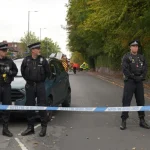
Crime in Washington, D.C., is a crisis. Six months ago, the Washington Examiner looked at some of the issues plaguing the nation’s capital. In the months since, things feel worse than ever, but that might be starting to change. In this series, we are looking at how the nation’s capital wound up with its record on crime, how it affects its standing in the world, and what can be done to turn the problem around. In part one of the series, we examined when this problem started, and what Washington’s leaders think is to blame.

Within the last six years, violent crime, particularly homicides, have been on the rise in Washington, D.C. However, it’s only within the last two years that crime in the district has dragged Washington into the national spotlight, placing pressure on local and federal lawmakers to make legislative changes.
While local leaders and congressional lawmakers agree there is a crime epidemic in the nation’s capital, they differ on two things: the root of the issue and the solutions to fix it.
The D.C. Council and national lawmakers have been at odds over legislation passed in the last four years aimed at addressing the crisis. Over the last two years, in particular, Republican legislators and campaigns have blamed Democrats on the D.C. Council for being too soft on crime, while councilmembers argue the fault lies in Washington’s lack of statehood.
CAPITAL PUNISHMENT: DC CRIME STATS IN EARLY 2024 COULD BE ON TRACK TO REBOUND AFTER DEADLY 2023
A “tsunami” of crime
Though Congress voted to nullify the D.C. Council’s attempt to overhaul its criminal code, and President Joe Biden signed the measure, House Oversight Committee Chairman James Comer (R-KY) said the message the council gave in approving the changes was that criminals could get away with infractions.
“The bad actors in D.C. realized they weren’t going to be held accountable for carjacking and burglary and robbery and things like that,” Comer said in an interview with the Washington Examiner. “And I think that led to a tsunami of crime in Washington, D.C. So that’s when we stepped in to try to right the wrong, and the wrong being irresponsible soft-on-crime and policies that the D.C. Council enacted.”
As of March 8, most crime in Washington is down, besides sex abuse at 9% and theft at 8%. All crime is at a 12% decline since this time last year. However, within the first three months of 2024, there have been 28 homicides, 417 robberies, and 866 motor vehicle thefts.
The year 2023 was marked by an 82% increase in motor vehicle theft in Washington and a 39% increase in violent crime. Robberies increased by 67%, and homicides increased by 35%.
Though crime is statistically going down, the stigma of a lack of public safety in Washington is enough to keep people out of the nation’s capital. Comer said while home in Kentucky he met a family that said they always wanted to visit Washington but were afraid to bring their children due to crime.
“You know, the fact that two young people had never been to the nation’s capital. Their parents were afraid to take him there for fear of getting robbed or murdered. And that’s just a terrible image,” the congressman said.
Rising crime in D.C. spurs legislation at all levels
For years, Washington has been an example Republicans point to as a case study of how rising crime can be blamed on failed Democratic policies. After the pandemic ushered in a wave of violence that continues to ravage the district’s once-flourishing downtown, recent upticks in juvenile offenses and carjackings forced Mayor Muriel Bowser and the D.C. Council to take another look at what the district can do to bring down criminal activity.
Earlier this month, the D.C. Council passed the Secure DC Omnibus bill comprised of several bills and measures that crack down on penalties for crimes such as carjackings and retail theft, as well as increase parameters for pre-trial juvenile detention. Since the start of the year, there have been 91 carjackings, with 52% involving guns. There have been 27 arrests, and 52% of the arrests have been juveniles.
Councilwoman Brooke Pinto, who spearheaded the omnibus bill, attributed a rise in national attention to some of the high-profile attacks on members of Congress, such as Reps. Henry Cuellar (D-TX) and Angie Craig (D-MN).
“I think when we’ve had some terrible incidents where members of Congress have been victimized by crime, members of their staff been attacked, tourists who have come from other cities who have been victimized by crime, and then calling their Congress member and saying, ‘What is going on here,’ has raised the level of national attention to this problem,” Pinto told the Washington Examiner.
This made it important for the D.C. Council to pass the omnibus bill to show the world that “as a whole government in the District of Columbia — from the mayor, to all of the council members, to our courts, our U.S. Attorney, our attorney general — that we know there is a problem and here are the over 100 interventions that we are now taking to decisively turn things around.”
Though Pinto said congressional Republicans “will never miss an opportunity to use the District of Columbia as a punching bag,” she and other councilmembers understood that the city needs to improve its ability to both demand accountability from police and also give them the tools to hire new officers and fight crime.
“I’ve always believed we can do both of those things at once,” Pinto said.
Comer said while the Secure DC Omnibus is a step in the right direction, “it is nowhere as strict as it should be.”
National lawmakers are working to address crime in the district with different pieces of legislation, as well. Comer placed some blame on the crime epidemic on Washington’s “ridiculous criminal justice reform,” such as the district defining a youth as being 25 or under.
On March 5, the same day the district passed the omnibus, Rep. Bryon Donalds (R-FL) introduced the DC CRIMES Act, which, among other provisions, would lower the definition of youth from 25 and under to 18 and under.
“If you’re over 18, you’re an adult,” Comer said. “So I think that’s a talking point that a lot of liberals use, ‘Oh, we’ve got a problem in Washington, D.C., it’s youth crime,’ because they’re classified in sentence as youth when they’re 24 years old. I mean, that’s ridiculous.”
D.C. councilmembers see statehood as solution
However, Pinto said some of the problem is due to the fact that Washington is not a state. The topic of statehood has been a battle district leaders, including Del. Eleanor Holmes Norton (D-DC), have been fighting for years — especially when it comes to gun control and court systems.
As a district and not a state, Washington does not have its own prison system and cannot appoint or elect its own judges. Pinto called the district’s criminal justice system “very complicated and bifurcated” with judges appointed by the president and approved by the Senate.
She also attributed a rise in criminal activity to the U.S. Attorney of Washington, D.C., being the only U.S. attorney’s office in the country that has to handle both local and federal prosecutions.
“That is too much of a burden on one U.S Attorney’s Office to handle, and so there are a myriad of ways that safety would be approved if the District of Columbia was a state and I will continue to fight for that,” Pinto said.
The D.C. U.S. Attorney’s office came under fire last year for declining to prosecute 67% of cases in 2022, doubling from 2015, when the office declined to prosecute 35% of cases. At the time, U.S. Attorney Matthew Graves blamed the declination of prosecutions on an unaccredited crime lab and police body-camera footage, leading to severe scrutiny.
Despite Pinto’s calls for statehood, Comer disagreed that the status of D.C. matters, pointing instead to Washington’s Democratic leaders.
“Whether they’re a state or a city, they would have the same leadership, the leadership of the city council,” Comer said. “And they’ve made terrible policy decisions that have had a detrimental effect on the crime rates in the city.”
The congressman said that he feels he has a good relationship with Bowser, and hopes he can continue to work with the city to address crime in Washington.
CLICK HERE TO READ MORE FROM THE WASHINGTON EXAMINER
“I do believe that stepping in to, to block their excessive soft-on-crime policies, has really made the city council react and try to recognize the fact that ‘OK, we went overboard, we need to get more serious on crime,’” Comer said.
“We’ve got a crime crisis in Washington, and that’s a priority for everyone in Congress because not only do we live here, our constituents come here every day, and we want them to feel safe in the nation’s capital.”







